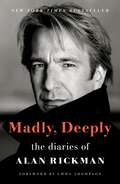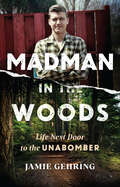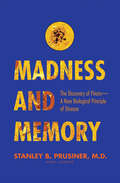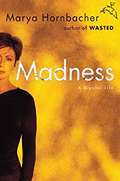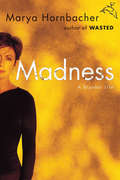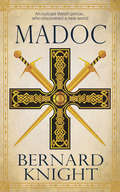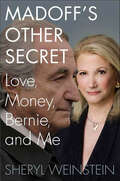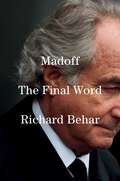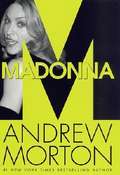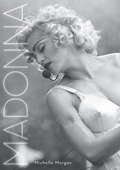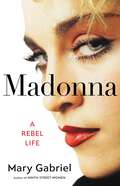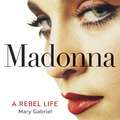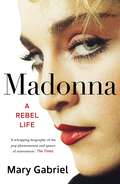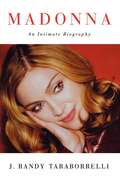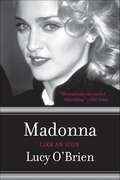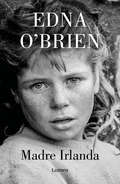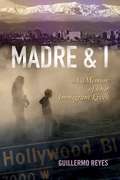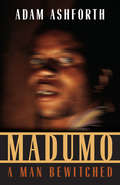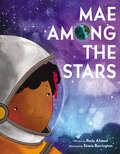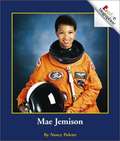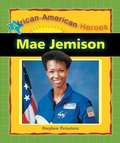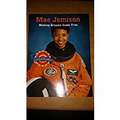- Table View
- List View
Madly, Deeply: The Diaries of Alan Rickman
by Alan RickmanAn international bestsellerOne of Barnes & Noble's Best Biographies & Memoirs of 2022Selected by the Guardian as one of the best books of 2022Amazon's choice for one of the best book gifts of 2023Madly, Deeply is a rare invitation into the mind of Alan Rickman—one of the most magnetic, beloved performers of our time. From his breakout role in Die Hard to his outstanding, multifaceted performances in the Harry Potter films, Galaxy Quest, Robin Hood: Prince of Thieves, and more, Alan Rickman cemented his legacy as a world-class actor. His air of dignity, his sonorous voice, and the knowing wit he brought to each role continue to captivate audiences today.But Rickman’s ability to breathe life into projects wasn't confined to just his performances. As you'll find, Rickman's diaries detail the extraordinary and the ordinary, flitting between worldly and witty and gossipy, while remaining utterly candid throughout. He takes us inside his home, on trips with friends across the globe, and on the sets of films and plays ranging from Sense and Sensibility, to Noël Coward's Private Lives, to the final film he directed, A Little Chaos.Running from 1993 to his death in 2016, the diaries provide singular insight into Rickman's public and private life. Reading them is like listening to Rickman chatting to a close companion. Meet Rickman the consummate professional actor, but also the friend, the traveler, the fan, the director, the enthusiast; in short, the man beyond the icon.Madly, Deeply features a photo insert, a foreword by Emma Thompson, and an afterword by Rima Horton.
Madman in the Woods: Life Next Door to the Unabomber
by Jamie GehringOne woman’s haunting sixteen-year account of her youth when she and her family lived closer than anyone to Ted Kaczynski, the Unabomber.As a child in Lincoln, Montana, Jamie Gehring and her family shared their land, their home, and their dinner table with a hermit with a penchant for murder. But they had no idea that the odd recluse living in the adjacent cabin was anything more than a disheveled man who brought young Jamie painted rocks as gifts. Ted was simply Ted, and erratic behavior, surprise visits, and chilling events while she was riding horses or helping her dad at his sawmill were dismissed because he was “just the odd hermit.” In fact, he was much more—Ted eluded the FBI for seventeen years while mailing explosives to strangers, earning the infamous title of Unabomber.In Gehring’s investigative quest twenty-five years later to reclaim a piece of her childhood and to answer the questions, why, how, she recalls what were once innocent memories and odd circumstances that become less puzzling in hindsight.The innocence of her youth robbed, Gehring needed to reconcile her lived experience with the evil that hid in plain sight. In this book, through years of research probing Ted’s personal history, his writings, his secret coded crime journals, her own correspondence with him in his Supermax prison cell, plus interviews with others close to Kaczynski, Gehring unearths the complexity, mystery, and tragedy of her childhood with the madman in the woods. And she discovers a shocking revelation—she and her family were in Kaczynski’s crosshairs.A work of intricately braided research, journalism, and personal memories, this book is a chilling response to the question: Do you really know your neighbor?Praise for Madman in the Woods“Combining the observations of a one-time close neighbor with extensive research and empathy for the many lives affected, Jamie Gehring’s book might well be the best attempt yet to understand the strange life and mind of my brother, Theodore J. Kaczynski.” —David Kaczynski,?author of?Every Last Tie: The Story of the Unabomber and His Family“A captivating look at Ted Kaczynski—the Unabomber—from a perspective that no one else on the planet has.?It is insightful, unique, and fascinating!? A must read for all true crime fans and anyone who loves to know the real story behind the story.” —Jim Clemente, retired FBI supervisory special agent/profiler and writer/producer of the Audible Original Series Where the Devil Belongs
Madness and Memory: The Discovery of Prions—A New Biological Principle of Disease
by Stanley B. PrusinerIn this &“utterly fascinating&” science memoir, the Nobel Prize–winning author chronicles his revolutionary discovery of a major cause of brain diseases (The New York Times). In 1997, Stanley B. Prusiner received the Nobel Prize in Physiology or Medicine for his research on devastating brain diseases. That he was the award&’s sole recipient was entirely appropriate. His struggle to identify the agent responsible for scrapie and mad cow disease in animals, and Creutzfeldt-Jakob disease in humans, had been waged largely alone, and in some cases, in the face of strenuous opposition. In Madness and Memory, Prusiner recounts the journey to his remarkable discovery of prions—infectious proteins that replicate and cause disease, but surprisingly contain no genetic material. Along the way, he sheds light on the world of contemporary science and the meticulousness and perseverance it requires. Through his telling, the agony and triumph of years of research comes to life, along with fascinating portraits of fellow scientists racing to make breakthrough discoveries. Prusiner&’s hypothesis, once considered heresy, now stands as accepted science and provides a path toward conquering such pervasive scourges as Alzheimer&’s, Parkinson&’s, Lou Gehrig&’s, and others diseases. &“Madness and Memory is the story of one of the most important discoveries in recent medical history, and it is also a vivid and compelling portrait of a life in science.&” —Oliver Sacks, MD, neurologist and author of Hallucinations
Madness: A Bipolar Life
by Marya HornbacherWhen Marya Hornbacher published her first book, Wasted: A Memoir of Anorexia and Bulimia, she did not yet know the reason for her all-but-shattered young life. At age twenty-four, Hornbacher was diagnosed with Type 1 rapid-cycle bipolar, the most severe form of bipolar disease there is. <P><P> In Madness, in her trademark wry and utterly self-revealing voice, Hornbacher tells her new story. Through scenes of astonishing visceral and emotional power, she takes us inside her own desperate attempts to control violently careening mood swings by self-starvation, substance abuse, numbing sex, and self-mutilation. How Hornbacher fights her way up from a madness that all but destroys her, and what it is like to live in a difficult and sometimes beautiful life and marriage-where bipolar always beckons-is at the heart of this brave and heart-stopping memoir.
Madness: A Bipolar Life
by Marya HornbacherIn the vein of An Unquiet Mind comes a storm of a memoir that will take you deep inside bipolar disorder and change everything you know. When Marya Hornbacher published her first book, Wasted: A Memoir of Anorexia and Bulimia, she did not yet have the piece of shattering knowledge that would finally make sense of the chaos of her life. At age twenty-four, Hornbacher was diagnosed with Type I rapid-cycle bipolar, the most severe form of bipolar disorder. In Madness, in her trademark wry and utterly self-revealing voice, Hornbacher tells her new story. Through scenes of astonishing visceral and emotional power, she takes us inside her own desperate attempts to counteract violently careening mood swings by self-starvation, substance abuse, numbing sex, and self-mutilation. How Hornbacher fights her way up from a madness that all but destroys her, and what it is like to live in a difficult and sometimes beautiful life and marriage—where bipolar always beckons—is at the center of this brave and heart-stopping memoir.Madness delivers the revelation that Hornbacher is not alone: millions of people in America today are struggling with a variety of disorders that may disguise their bipolar disease. And Hornbacher's fiercely self-aware portrait of her own bipolar as early as age four will powerfully change, too, the current debate on whether bipolar in children actually exists. New York Times&“Humorous, articulate, and self-aware…A story that is almost impossible to put down.&”— &“With the same intimately revelatory and shocking emotional power that marked [Wasted], Hornbacher guides us through her labyrinth of psychological demons.&”—Elle
Madoc
by Bernard KnightThe epic story of Prince Madoc, son of the ruler of North Wales, who after the death of his wife leaves behind the battles for power and prestige in his homeland and journeys into the unknown, sailing with a small group of companions across the Western Ocean.In this novel, acclaimed author Knight skilfully blends historical fact and the histories of medieval Britain and France with the story of a Welsh prince who, legend says, discovered the continent of North America.
Madoc
by Bernard KnightThe epic story of Prince Madoc, son of the ruler of North Wales, who after the death of his wife leaves behind the battles for power and prestige in his homeland and journeys into the unknown, sailing with a small group of companions across the Western Ocean.In this novel, acclaimed author Knight skilfully blends historical fact and the histories of medieval Britain and France with the story of a Welsh prince who, legend says, discovered the continent of North America.
Madoff's Other Secret: Love, Money, Bernie, and Me
by Sheryl WeinsteinNobody knew Bernie like I did, and nobody knows about me…Sheryl Weinstein met Bernie Madoff when she was just shy of forty, and went on to have a twenty-year secret, intimate relationship with the man now known as an evil mastermind, a villain of the greatest proportions. It was 1988 and Sheryl was facing a huge dilemma. Bernie Madoff was paying her a great deal of attention. She was in the midst of a rocky marriage and feeling vulnerable, when the powerful Wall Street mogul began making overtures. As a successful CPA and head of a major charitable organization, she had a lot to lose. She directed him to take things slowly. Over the next five years, there were business meetings over lunch, followed by intimate dinners in hotel rooms and finally, private moments that for a time seemed intensely satisfying to them both. "I'm not to be trusted," he once told her casually. She ignored it, having no idea how prophetic those words would be. After all, her relationship with Bernie was passionate and profound. She felt desirable. She was the one nobody knew about, with the window into the real man. So careful about investing her money, when the SEC cleared him in 1992 she decided to get in all the way--with her heart, her soul--and her financial future.Sheryl was in the wrong place at the wrong time. She couldn't possibly have imagined the devastation that would befall her. Learning the truth was shattering on so many levels. Many books are being written about the scale of Madoff's fraud, but until now, nothing has shown the man through private eyes. Sheryl Weinstein's riveting story reveals a Madoff who will shock and surprise you. From the boardroom to the bedroom, in each other, the two found something that had been lacking in their own lives. It's a story with tragic overtones--a drama that only now could find a devastating conclusion.
Madoff: The Final Word
by Richard BeharRenowned investigative journalist Richard Behar delivers the definitive account of history&’s largest—and longest-running—financial fraud, &“the scale of the deception…beggars belief&” (New York Post).Some $68 billion evaporated during Bernie Madoff&’s epic confidence game. Two people were driven to suicide in the wake of the Ponzi Scheme&’s exposure. Others went to prison. But there has never been a satisfying accounting for how Bernie got away with so much, for so long. Until now. Richard Behar&’s relationship with Madoff began in 2011 with a simple email request from the conman. By the time Madoff died in 2021, he had sent Behar more than 300 emails and dozens of handwritten letters, participated in some fifty phone conversations, and sat for three in-person jailhouse interviews—a level of access provided to no other reporter. Behar also established relationships with hundreds of regulators, prosecutors, FBI agents, investors, Wall Street experts, ex-employees of Madoff&’s, family members, school classmates, and others. The result is the final word on the criminal behind history&’s most enduring fraud—and on those who believed him, covered for him, or locked him up. Behar illuminates not only the fraud&’s origins—decades earlier than Madoff claimed in his confession—but also the complicity of investors, Wall Street insiders, family members, and some of the largest banks in the US and Europe. Shocking, infuriating, riveting (and at times absurdly funny), Madoff shows us how Bernie ensnared thousands of investors. As Behar&’s dogged reporting over the last fifteen years makes clear, however, there aren&’t many innocents left standing by the end of this tale. Just about everyone involved is guilty, at a minimum, of humanity&’s most consistent weakness: greed.
Madonna
by Andrew MortonMorton's extensive, in-depth interviews with members of Madonna's inner circle allow him to unmask the real Madonna. Andrew Morton unfolds the real story of Madonna's family background; her relationships with Michael Jackson, Prince, John F. Kennedy Jr., Vanilla Ice, and other rock and Hollywood stars; the mystery man she wanted to marry; and the darkest days of her career. In this fascinating, richly detailed biography, Andrew Morton reveals Madonna in an entirely new light.
Madonna
by Michelle MorganMadonna: singer, songwriter, actress, businesswoman, not to mention one of the most renowned cultural icons of the last three decades. Since her first, eponymous album, over thirty years ago Madonna has sold a remarkable 300 million records worldwide, making her the top-selling female recording artist of all time.Madonna is famous for continuously reinventing both her music and her image. By pushing the boundaries of mainstream popular music with both her lyrical content and the imagery in her music videos she achieved extraordinary popularity. Morgan offers a richly illustrated, comprehensive account of the artist's phenomenally successful career shedding new light on her videos, books, tours, fashion, charity work and every other aspect of her life.Praise for Marilyn Monroe: Private and Undisclosed:'A gorgeous collection offering a fascinating insight into Monroe's personal life' Women & Home'A touching portrayal of the star in her more private moments' Empire'The most authoritative book on the star to date' Choice
Madonna (Mammoth Bks.)
by Michelle MorganMadonna: singer, songwriter, actress, businesswoman, not to mention one of the most renowned cultural icons of the last three decades. Since her first, eponymous album, over thirty years ago Madonna has sold a remarkable 300 million records worldwide, making her the top-selling female recording artist of all time. Madonna is famous for continuously reinventing both her music and her image. By pushing the boundaries of mainstream popular music with both her lyrical content and the imagery in her music videos she achieved extraordinary popularity. Morgan offers a richly illustrated, comprehensive account of the artist's phenomenally successful career. Reviews, interviews, commentary, and Madonna's own words shed new light on her videos, books, tours, fashion, charity work and every other aspect of her life.
Madonna of the Seven Hills (Lucrezia Borgia #1)
by Jean PlaidyThe most beautiful woman in Rome, Lucrezia Borgia, was born into a family-and a destiny-she could not hope to escape . . . Fifteenth-century Rome: The Borgia family is on the rise. Lucrezia#x19;s father, Pope Alexander VI, places his illegitimate daughter and her only brothers, Cesare, Giovanni, and Goffredo, in the jeweled splendor-and scandal-of his court. From the Pope#x19;s affairs with adolescent girls to Cesare#x19;s dangerous jealousy of anyone who inspires Lucrezia#x19;s affections to the ominous birth of a child conceived in secret, no Borgia can elude infamy. Young Lucrezia gradually accepts her fate as she comes to terms with the delicate nature of her relationships with her father and brothers. The unbreakable bond she shares with them both exhilarates and terrifies her as her innocence begins to fade. Soon she will understand that her family#x19;s love pales next to their quest for power and that she herself is the greatest tool in their political arsenal. From the inimitable pen of Jean Plaidy, this family#x19;s epic legend is replete with passion, intrigue, and murder-and it#x19;s only the beginning.
Madonna: A Rebel Life
by Mary GabrielNew York Times Editors&’ Choice, One of NPR&’s Best Books of the YearIn this &“infinitely readable&” biography, award-winning author Mary Gabriel chronicles the meteoric rise and enduring influence of the greatest female pop icon of the modern era: Madonna (People Magazine) With her arrival on the music scene in the early 1980s, Madonna generated nothing short of an explosion—as great as that of Elvis or the Beatles—taking the nation by storm with her liberated politics and breathtaking talent. Within two years of her 1983 debut album, a flagship Macy's store in Manhattan held a Madonna lookalike contest featuring Andy Warhol as a judge, and opened a department called &“Madonna-land.&” But Madonna was more than just a pop star. Everywhere, fans gravitated to her as an emblem of a new age, one in which feminism could shed the buttoned-down demeanor of the 1970s and feel relevant to a new generation. Amid the scourge of AIDS, she brought queer identities into the mainstream, fiercely defending a person's right to love whomever—and be whoever—they wanted. Despite fierce criticism, she never separated her music from her political activism. And, as an artist, she never stopped experimenting. Madonna existed to push past boundaries by creating provocative, visionary music, videos, films, and live performances that changed culture globally. Deftly tracing Madonna&’s story from her Michigan roots to her rise to super-stardom, master biographer Mary Gabriel captures the dramatic life and achievements of one of the greatest artists of our time.
Madonna: A Rebel Life - The Biography
by Mary GabrielIn this exceptional biography, Pulitzer Prize finalist Mary Gabriel chronicles the meteoric rise and enduring influence of the greatest female pop icon of the modern era: Madonna.'Daring to write a biography of a woman with whom the entire world is on a first-name basis, Mary Gabriel has created (astonishingly) a book neither gossip-driven nor highly snarky... she reveals instead a Madonna both more true and more unbelievably believable; a rock-and-roll suffragette... Norman Mailer once said to Madonna, 'I've come to the conclusion that you are a great artist.' Exquisitely detailed in her storytelling, Gabriel is clearly in that camp, convincing us that we all still vogue in the House of Madonna.'Brad Gooch, author of City Poet With her arrival on the music scene in the early 1980s, Madonna generated nothing short of an explosion - as great as that of Elvis or the Beatles - taking the nation by storm with her liberated politics and breathtaking talent. But Madonna was more than just a pop star. Everywhere, fans gravitated to her as an emblem of a new age, one in which feminism could shed the buttoned-down demeanour of the 1970s and feel relevant to a new generation. Amid the scourge of AIDS, she brought queer identities into the mainstream, fiercely defending a person's right to love whomever - and be whoever - they wanted. Despite fierce criticism, she never separated her music from her political activism. And as an artist, she never stopped experimenting. Madonna existed to push past boundaries by creating provocative, visionary music, videos, films and live performances that changed culture globally. Deftly tracing Madonna's story from her Michigan roots to her rise to super-stardom, master biographer Mary Gabriel captures the dramatic life and achievements of one of the greatest artists of our time.
Madonna: A Rebel Life - The Biography
by Mary Gabriel'A whopping biography of the pop phenomenon and queen of reinvention. Life is a mystery - hers oughtn't to be after reading this.' THE TIMES, ' biggest books for autumn''A fascinating take on one of music's greatest icons' BELFAST TELEGRAPHIn this exceptional biography, Pulitzer Prize finalist Mary Gabriel chronicles the meteoric rise and enduring influence of the greatest female pop icon of the modern era: Madonna.'Daring to write a biography of a woman with whom the entire world is on a first-name basis, Mary Gabriel has created (astonishingly) a book neither gossip-driven nor highly snarky... she reveals instead a Madonna both more true and more unbelievably believable; a rock-and-roll suffragette... Norman Mailer once said to Madonna, 'I've come to the conclusion that you are a great artist.' Exquisitely detailed in her storytelling, Gabriel is clearly in that camp, convincing us that we all still vogue in the House of Madonna.'Brad Gooch, author of City Poet With her arrival on the music scene in the early 1980s, Madonna generated nothing short of an explosion - as great as that of Elvis or the Beatles - taking the nation by storm with her liberated politics and breathtaking talent. But Madonna was more than just a pop star. Everywhere, fans gravitated to her as an emblem of a new age, one in which feminism could shed the buttoned-down demeanour of the 1970s and feel relevant to a new generation. Amid the scourge of AIDS, she brought queer identities into the mainstream, fiercely defending a person's right to love whomever - and be whoever - they wanted. Despite fierce criticism, she never separated her music from her political activism. And as an artist, she never stopped experimenting. Madonna existed to push past boundaries by creating provocative, visionary music, videos, films and live performances that changed culture globally. Deftly tracing Madonna's story from her Michigan roots to her rise to super-stardom, master biographer Mary Gabriel captures the dramatic life and achievements of one of the greatest artists of our time.
Madonna: An Intimate Biography
by J. Randy TaraborrelliMadonna! Megastar. Lover. Mother. Opportunist. Chameleon. Role model. She's all of these things...and more. Yet, who is she, really? In Madonna: An Intimate Biography, author J. Randy Taraborrelli's scrupulously researched and completely balanced unauthorized biography of one of the world's most celebrated entertainers, the reader is allowed to draw his or her own conclusions. Indeed, the portrait bestselling author Taraborrelli paints here is of a truly complex woman, one who is driven and determined to succeed at any cost, yet who displays remarkable vulnerability when it comes to matters of the heart. It is significant that Madonna: An Intimate Biography is the first such book written about the star in over a decade, because in the past ten years the ever-changing Madonna has gone through her biggest transformation yet -- from tempestuous sex goddess to happily married mother. Amazingly, as she launches her first worldwide tour in eight years, she is now -- at forty-something -- enjoying one of the most successful periods of her groundbreaking career. Whereas other books about Madonna have been based on previously published material, Madonna: An Intimate Biography is the result of ten years of exclusive interviews with people who are speaking publicly about her for the first time, including close friends, business associates and even family members. Since Taraborrelli interviewed the star herself early in her career, he is now able to draw from such firsthand experiences to place her success story in perspective and provide new, stunning insights. The true Madonna, as presented here, is not merely a sensation-seeking tabloid vixen, but a flesh-and-blood woman with human foibles and weaknesses -- as well as great strengths and ambitions. For the first time, the reader learns about the complex nature of her difficult relationship with her father, and how the two finally found one another after years of estrangement; how Warren Beatty broke her heart, and why the two never wed; how she and John Kennedy, Jr., became romantically involved, his mother's reaction to the prospect of Madonna as a daughter-in-law and why it could never have worked out; the truth of her relationships with the fathers of her two children and how, as a loving and attentive mother, she has evolved into a surprisingly different woman...and what the future holds for her. Madonna: An Intimate Biography is a truly explosive and definitive account of the life of an entertainer who is undoubtedly one of the most popular, trendsetting figures of our time. Full of amazing disclosures about her private life and public career, New York Times bestselling author J. Randy Taraborrelli's latest work reveals Madonna in a new -- and surprisingly inspiring -- way. Not only a feast for fans, this book is great entertainment for anyone who enjoys a remarkable story, stirringly told.
Madonna: Like an Icon
by Lucy O'BrienMaterial Girl . . . Immaculate sexpot . . . Superstar . . . Mother . . . Kabbalah enthusiast . . . For three decades she has defied categorization. . . . She remains one of our greatest living pop icons.Here is the groundbreaking biography that finally solves the mystery at the heart of Madonna's chameleonlike existence. Drawing upon scores of candid interviews with producers, musicians, collaborators, lovers, and friends, Lucy O'Brien's Madonna: Like an Icon explores the complex personality and legendary drive that have made Madonna the most famous female pop artist of our time. From her mother's premature death to Madonna's dynamic arrival on the New York club scene, from "Like a Virgin" to Evita and beyond, every stage of this dazzling star's life and career is brilliantly illuminated—the stereotypes deconstructed, the lies exposed, the artist examined, the legend celebrated.
Madre Irlanda
by Edna O'BrienEl retrato de una vida y un país, por «la escritora de lengua inglesa con más talento de nuestros días» (Philip Roth); «simplemente, una de las mejores de nuestro tiempo» (John Banville) «Edna O’Brien escribe las historias más bellas. Ningún escritor puede compararse a ella, en ningún lugar.»Alice Munro Irish Pen Award * American National Arts Gold Medal * Ulysses Medal * Bob Hughes Award * Prix Spécial Femina Étranger * David Cohen Prize * PEN/Nabokov Award Irlanda siempre ha sido mujer, útero, cueva, vaca, Rosaleen, marrana, novia, ramera... La multipremiada autora de Las chicas de campo entreteje su autobiografía —su infancia en el condado de Clare, los días en la escuela de monjas, su primer beso o su huida a Inglaterra— con la esencia de Irlanda, una tierra de mitos,poesía, supersticiones, costumbres ancestrales, sabiduría popular y extrema belleza. Madre Irlanda es, según The Guardian, «Edna O’Brien en su máximo esplendor. Un relato evocador y elegante de un entorno natural y de quienes lo habitan, lleno de audacia e ingenio». La crítica ha dicho...«O'Brien levantó la viga de su poderosa escritura aprovechando su relación de amor/odio con su país, Irlanda. Denostada, prohibida y, hoy, celebrada, ahora publica sus memorias inflamables. [...] Uno de sus libros más celebrados: un texto intenso en el que entrelaza su biografía desobediente con la evocación de una tierra de mitos, poesía, supersticiones, costumbres ancestrales, sabiduría popular y extrema belleza. Su país.»Antonio Lucas, El Mundo «Edna O’Brien mueve montañas tanto líricas como políticas a través de su escritura.»Jurado del Premio David Cohen «No he conocido a nadie que viva, escriba, piense, provoque, se atreva, se emocione y crezca como Edna.»Richard Ford, The Irish Times «Ligando su historia personal con la de Irlanda, O’Brien trenza con gracia las costumbres locales y antiguas tradiciones con los fascinantes eventos y personajes que poblaron su juventud. [...] Una narración colorida y atempora.»The Sunday Times «Una de las primeras mujeres que mostró la verdadera Irlanda: política, social, sexual y espiritualmente.»Liadan Hynes, The Independent «Su ficción no representa una mera conmemoración de la pérdida de valores pasados, ni una vuelta a la nostalgia como estrategia estética, sino la celebración de una nueva Irlanda y de la mujer en la Irlanda del siglo veintiuno, ahondando en una representación sociológica de este nuevo país.»Asier Altuna-García de Salazar, RIULL «Su genialidad procede del dolor mismo de la memoria.»John Berger «La escritora de lengua inglesa con más talento de nuestros días.»Philip Roth «Simplemente, una de las mejores escritoras de nuestro tiempo.»John Banville «Irlanda es su paisaje y, [...] a pesar de ser la fuente de buena parte de su material, ha sido dura con ella, salvaje.»Eileen Battersby, The Irish Times «Edna O'Brien en su máximo esplendor. Un relato evocador y elegante de un entorno natural y de quienes lo habitan, lleno de audacia e ingenio.»William Trevor, The Guardian «Una maestra de la palabra y una confesora seductora y sincera de sus sueños, anhelos y pecados. [...] Una joya: éxtasis, remordimiento, humor y una escritura bellísima.»Paul Baumann, Commonweal «La literatura de Edna O'Brien está atravesada por una forma piadosa de rencor. [...] O'Brien cierra heridas, pero no hiere.»Ricardo Martínez Llorca, Revista de Letras «Ningún autor inglés es tan bueno poniendo al lector en la piel de una mujer.»Evening Standard «Edna O'Brien ha a
Madre and I: A Memoir of Our Immigrant Lives
by Guillermo A. ReyesIn this moving and funny memoir, award-winning playwright Guillermo Reyes untangles his life as the secretly illegitimate son of a Chilean immigrant to the United States and as a young man struggling with sexual repression, body image, and gay identity. But this is a double-decker memoir that also tells the poignant, bittersweet, and adventurous story of Guillermo's mother, Maria, who supports herself and her son cleaning houses and then working as a nanny in Washington, D. C. and eventually in Hollywood. In one memorable scene, after realizing that her friend Carmen is cleaning the house of one of the producers of Annie Hall, Maria recruits her to take her picture as she poses dramatically with Mr. Joffe's Oscar in hand. It is Maria's defiant yet determined attitude amidst her sacrifices that allows for Guillermo's spirited coming of age and coming out. Their common ground is the drama of their encounters with discovery, heartbreak, and passion--the explosive emotions that light up the stage of their two-actor theater. Honorable Mention, Best Auto/Biography in English, International Latino Book Awards
Madumo: A Man Bewitched
by Adam AshforthThe author tells a story about his friend, a young man named Madumo, struggling to free himself from the curse of witchcraft in Soweto, South Africa. It is based upon shared experiences and taped conversations, interviews and discussions with others, journals, and letters.
Mae Among the Stars
by Roda AhmedA beautiful picture book for sharing and marking special occasions such as graduation, inspired by the life of the first African American woman to travel in space, Mae Jemison. An Amazon Best Book of the Month!A great classroom and bedtime read-aloud, Mae Among the Stars is the perfect book for young readers who have big dreams and even bigger hearts.When Little Mae was a child, she dreamed of dancing in space. She imagined herself surrounded by billions of stars, floating, gliding, and discovering.She wanted to be an astronaut.Her mom told her, "If you believe it, and work hard for it, anything is possible.”Little Mae’s curiosity, intelligence, and determination, matched with her parents' encouraging words, paved the way for her incredible success at NASA as the first African American woman to travel in space.This book will inspire other young girls to reach for the stars, to aspire for the impossible, and to persist with childlike imagination.
Mae Jemison (African-American Heroes)
by Stephen FeinsteinAs a little girl, Mae Jemison dreamed about being an astronaut. She became a medical doctor and engineer, but she held onto her dream. In 1992, she was the first African-American woman in space. This easy biography will inspire early independent readers.
Mae Jemison Making Dreams Come True (Houghton Mifflin Reading Leveled Readers)
by C. M. Thorsen"The space shuttle Endeavour launched from Kennedy Space Center on September 12, 1992. This was the first time astronauts from the United States and Japan worked together. But it was important for another reason as well. On board was a special woman, Dr. Mae Carol Jemison. She was the mission's science specialist and was also the first African American woman to voyage into space. This book is a biography of Dr. Mae Carol Jemison."
